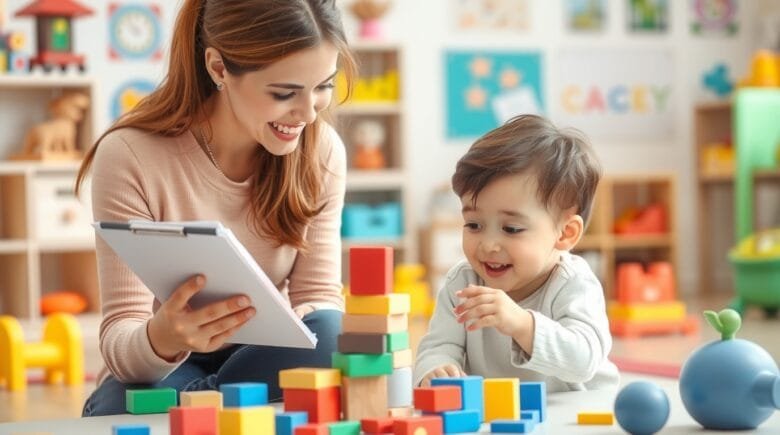Introduction to Preschool Skills
The preschool years represent a foundational period in a child’s development, where critical skills are cultivated that will serve as a base for future learning and social interaction. During this stage, children typically aged three to five, exhibit burgeoning capacities in cognitive, emotional, social, and physical domains. Each of these areas contributes significantly to their overall growth and readiness for more structured learning environments, such as kindergarten.
A preschool skills checklist serves as a valuable tool for parents and educators alike, offering a framework to evaluate a child’s progress in these essential skills. By monitoring development through this structured resource, caregivers can ascertain if a child meets typical milestones, while also identifying areas that may require additional support. This checklist not only encompasses academic readiness but also emphasizes emotional resilience and social competencies, highlighting the multifaceted nature of early childhood education.
Understanding the importance of preschool skills can assist families and teachers in creating stimulating environments that encourage exploration and learning. Cognitive skills, for instance, involve problem-solving and language development, enabling children to express ideas and understand their surroundings. Likewise, social skills foster peer relationships and effective communication, which are crucial for cooperative play and group activities. Additionally, physical skills, encompassing both fine and gross motor abilities, are instrumental in a child’s independence and confidence in navigating the world. Together, these dimensions of development encapsulate why thorough evaluation is imperative for children’s readiness for the next stage of their educational journey.
In conclusion, familiarizing oneself with the preschool skills checklist supports educators and parents in nurturing each child’s unique potential, ultimately facilitating a smoother transition into formal schooling.
Cognitive Skills Development
Cognitive development is a crucial aspect of early childhood education, as it forms the foundation for learning in preschool and beyond. The preschool skills checklist emphasizes several key cognitive skills that children should ideally exhibit before entering preschool. Among these skills, problem-solving abilities are vital. For instance, children can engage in simple puzzle games or building blocks, which encourage them to think critically and approach challenges creatively.
Memory also plays an essential role in cognitive skills development. Activities such as memory card games or storytelling can enhance a child’s ability to remember and recall information. Parents and caregivers can aid this process by frequently asking questions about stories read together, thus encouraging retention and comprehension. Attention span is another important cognitive milestone. Children should be able to focus on a task for at least a short period; activities such as drawing or playing with playdough can help develop this focus.
Moreover, early literacy and numeracy skills are foundational cognitive competencies necessary for preschool readiness. Pre-reading activities, including letter recognition through alphabet games or letter hunts, promote literacy. To bolster numeracy, children can practice counting objects in their environment or engage in simple sorting tasks, which serve as effective early math exercises. These engaging activities not only contribute to cognitive growth but also align with the preschool skills checklist, ensuring children are well-prepared for the complexity of a classroom setting.
It is important for parents and educators to create a nurturing environment where children can explore these cognitive milestones through play and structured activities. By implementing varied games and tasks that address problem-solving, memory, attention span, and basic literacy and numeracy skills, caregivers can effectively support the healthy cognitive development of young learners.
Emotional and Social Skills
Emotional and social skills are pivotal for children as they prepare for preschool, laying the groundwork for future relationships and interactions. These skills encompass a wide range of abilities, including emotional regulation, empathy, sharing, and effective peer interaction. A child who has developed these competencies is better equipped to navigate the social landscapes of preschool and beyond, making the understanding of this preschool skills checklist particularly important for parents and caregivers.
One of the foundational elements of emotional and social skills is emotional regulation, which refers to the ability to manage one’s emotions in various situations. Children learn to recognize their feelings and respond appropriately, reducing instances of overwhelming frustration or sadness. This capability can significantly impact their social interactions, enabling them to engage positively with peers. To cultivate emotional regulation, parents can model healthy emotional responses and utilize age-appropriate discussions about feelings.
Empathy, another crucial skill, involves understanding and responding to the emotions of others. Teaching children to identify others’ feelings helps them develop strong, cooperative relationships with peers. Parents can encourage this by promoting discussions around emotions and sharing stories that highlight different emotional responses.
Sharing and taking turns are also integral to preschool readiness. These activities foster a sense of community and belonging among children. At home, parents can create opportunities for sharing, such as during playtime or group activities with siblings or friends. Structured playdates or group activities can also enhance these social skills by providing children with practice in a safe and supportive environment.
In conclusion, fostering emotional and social skills in early childhood is essential for ensuring children are prepared for preschool. By focusing on emotional regulation, empathy, sharing, and peer interaction, parents can effectively support their children’s development, encouraging healthy relationships and building the confidence necessary for successful social engagement.
Physical Development and Motor Skills
The physical development of children during their preschool years lays the foundation for their overall growth and learning capabilities. The development of motor skills, which can be categorized into fine and gross motor skills, is essential at this stage. Fine motor skills involve the use of small muscles, particularly in the hands and fingers, while gross motor skills pertain to larger muscle groups used for movements such as running, jumping, and climbing. A thorough preschool skills checklist should include key motor milestones that children ideally reach during this vital phase of their early childhood development.
One of the critical components of gross motor development is hand-eye coordination. This skill enables children to perform a variety of activities, such as catching a ball or participating in physical games. As they engage in these activities, they develop balance and agility, which are also important for overall coordination. Fine motor skills, on the other hand, are crucial for tasks that require precision, such as drawing, cutting with scissors, and completing puzzles. Achieving a balance between these two skill sets is vital for a child’s confidence and independence.
Parents can play a significant role in enhancing their child’s physical abilities by integrating fun activities into their daily routines. Simple playtime options, such as playing catch or engaging in interactive games, can help improve gross motor skills. Meanwhile, activities like building with blocks, stringing beads, or coloring can foster fine motor development. Additionally, structured activities such as dance classes, swimming lessons, or organized sports can provide opportunities for children to refine their physical capabilities while enjoying the process. In conclusion, a well-rounded preschool skills checklist that includes a focus on physical development encourages children to engage in activities that are crucial for their motor skills growth and overall well-being.
Communication Skills and Language Development
Effective communication skills and language development are fundamental components of a preschooler’s growth, playing a pivotal role in their overall development. As children reach preschool age, they are expected to exhibit certain language milestones that reflect their cognitive and social maturity. One of the primary indicators of language development is vocabulary growth, where children typically acquire and use a range of words to express their thoughts and needs. By age three, most children can use up to 1,000 words, and by age four, this number can expand significantly. This growth supports their ability to engage in meaningful conversations and navigate social interactions.
Another critical aspect of language development includes sentence formation. Preschoolers begin constructing simple sentences, gradually building towards more complex structures. They learn to combine words to form coherent thoughts, enhancing their ability to articulate ideas effectively. This progression not only signifies their linguistic development but also indicates their cognitive abilities and understanding of the world around them.
Verbal expression is an essential component of communication skills, as it enables preschoolers to share their emotions, thoughts, and experiences. Engaging children in conversations and encouraging them to express themselves fosters this skill. Parents and educators can implement various strategies to enhance language development. Reading aloud is one of the most effective methods, as it exposes children to new vocabulary and different sentence structures while stimulating their imagination. Furthermore, engaging in interactive discussions, asking open-ended questions, and providing feedback on their language use can significantly encourage verbal expression.
Promoting communication skills and language development through these techniques contributes to a preschooler’s overall growth and confidence in social situations. A comprehensive preschool skills checklist that includes communication milestones can help caregivers monitor language progression and identify any areas requiring additional support. In conclusion, fostering these skills lays the foundation for successful interactions in later stages of education and personal development.
Self-Care and Independence
Developing self-care skills is a vital part of early childhood development and prepares children for their transition into preschool. A well-rounded preschool skills checklist will typically highlight essential milestones that indicate a child’s readiness to manage personal care. Key areas include dressing, toileting, eating, and personal hygiene. Each of these skills contributes to a child’s overall independence, which is crucial in a preschool setting.
One of the primary skills children should master is dressing themselves. By the age of four, most children can independently put on simple clothing and fasten items like buttons or zippers with minimal assistance. Parents can facilitate this process by practicing dressing during playtime or offering clothing choices that are easy to manage, such as elastic waist bands and large buttons.
Toileting is another vital area that children should be able to handle before entering preschool. Potty training usually begins around age two to three, and by four, children should be consistently able to use the toilet independently. Encouraging routines and celebrating successes can help bolster confidence in this sensitive skill.
Eating skills are also fundamental. Children should learn to use utensils effectively and manage snack time or mealtime with minimal assistance. Providing opportunities for self-serving and allowing children to practice pouring drinks can enhance their competence in eating independently.
Finally, personal hygiene, which includes washing hands, brushing teeth, and grooming, is essential for implementing self-care routines in young children. Parents should model these behaviors and engage children in interactive hygiene practices to solidify these habits. By promoting independence in these areas, parents will not only support their child’s preschool readiness but also foster essential life skills that will benefit them long after preschool.
Building a Positive Learning Environment
Creating a nurturing and stimulating learning environment at home is crucial for children’s early development. This supportive atmosphere encourages children to explore, learn, and grow, effectively aligning with the components outlined in a preschool skills checklist. An effective way to foster such a learning space is through the organization of educational activities that stimulate curiosity and engagement.
Parents can create structured playtime that focuses on specific learning objectives, such as enhancing motor skills or developing language abilities. Activities such as reading together, engaging in arts and crafts, and building with blocks not only promote play but also target essential preschool skills, thereby setting children on the path to success. Additionally, incorporating educational games and puzzles can cultivate critical thinking and problem-solving skills, both vital for a child’s academic future.
Providing varied resources is another essential aspect of nurturing a positive learning environment. This can include not only books but also educational toys, art supplies, and digital resources that stimulate learning through play. By offering a range of materials, children are encouraged to explore different ideas and concepts, aligning seamlessly with milestones listed in a preschool skills checklist. Regularly rotating these resources keeps interest alive and exposes children to new subjects and activities, contributing significantly to their overall learning experience.
Equally important is fostering a love for learning. Parents can model curiosity and enthusiasm towards education, demonstrating that learning is a lifelong journey. Encouragement and positive reinforcement can go a long way in making children feel valued and motivated to learn. Celebrating small achievements and progress not only boosts their confidence but also ingrains a desire for knowledge that will benefit them in preschool and beyond.
Using the Preschool Skills Checklist Effectively
The preschool skills checklist serves as a valuable tool for both parents and educators in assessing the developmental milestones of children. To utilize this checklist effectively, it is crucial to approach the evaluation with a realistic mindset. Begin by reviewing each skill on the checklist and observing the child in various settings. This comprehensive approach provides a clearer picture of the child’s abilities rather than relying solely on isolated observations or standardized tests.
When assessing the child’s skills, consider the context in which they may perform differently. For example, a child might demonstrate strong social skills in a familiar environment like home but may struggle in group settings like preschool. This nuanced understanding helps in identifying both strengths and areas that may require further development. Using the preschool skills checklist not only aids in recognizing these skills but also facilitates the identification of specific domains, such as cognitive, emotional, and social skills, where additional support may be warranted.
Moreover, effective communication is vital among parents, educators, and health professionals. Creating an open dialogue ensures that every stakeholder is aware of the child’s developmental needs and can work collaboratively towards addressing any concerns. Regular meetings can be scheduled to discuss findings from the checklist and to develop strategies for enhancing the child’s growth. This transparency fosters a supportive environment, offering the child the best possible chance for success in their educational journey.
In conclusion, the preschool skills checklist can be an instrumental resource when used thoughtfully. By assessing skills realistically and fostering open communication among all parties involved, it is possible to guide children toward meeting their developmental milestones more effectively.
Conclusion: Supporting Preschool Readiness
As we have explored throughout this blog post, preschool readiness is a multifaceted process that encompasses various skills and developmental milestones. The preschool skills checklist serves as an essential tool for parents and educators, guiding them in identifying and nurturing the abilities children need to thrive in a school setting. By breaking down these skills into key areas, we can help ensure children possess the foundational competencies to navigate their educational journeys successfully.
Parents play a crucial role in fostering an environment conducive to learning and growth. Engaging with children through play, discussions, and everyday activities can significantly enhance their readiness for preschool. It is vital for parents to monitor their children’s developmental progress using a preschool skills checklist, which can provide insight into areas where additional supports may be beneficial. Moreover, being proactive in seeking resources, whether through community programs or educational materials, can further bolster children’s learning experiences.
Similarly, educators have a responsibility to create inclusive environments that cater to the diverse needs of their students. Understanding the milestones and skills outlined in the preschool skills checklist can enable teachers to design targeted activities that encourage exploration, collaboration, and problem-solving. Addressing each child’s unique strengths and challenges will allow educators to build their confidence and foster a love for learning.
In conclusion, supporting preschool readiness is a shared endeavor that requires the involvement of both parents and educators. As we continuously work together to cultivate children’s skills and confidence, we not only prepare them for preschool but also lay the groundwork for their future educational success. Encouraging open communication, sharing resources, and remaining engaged in early childhood development can empower children to become capable, enthusiastic learners.



